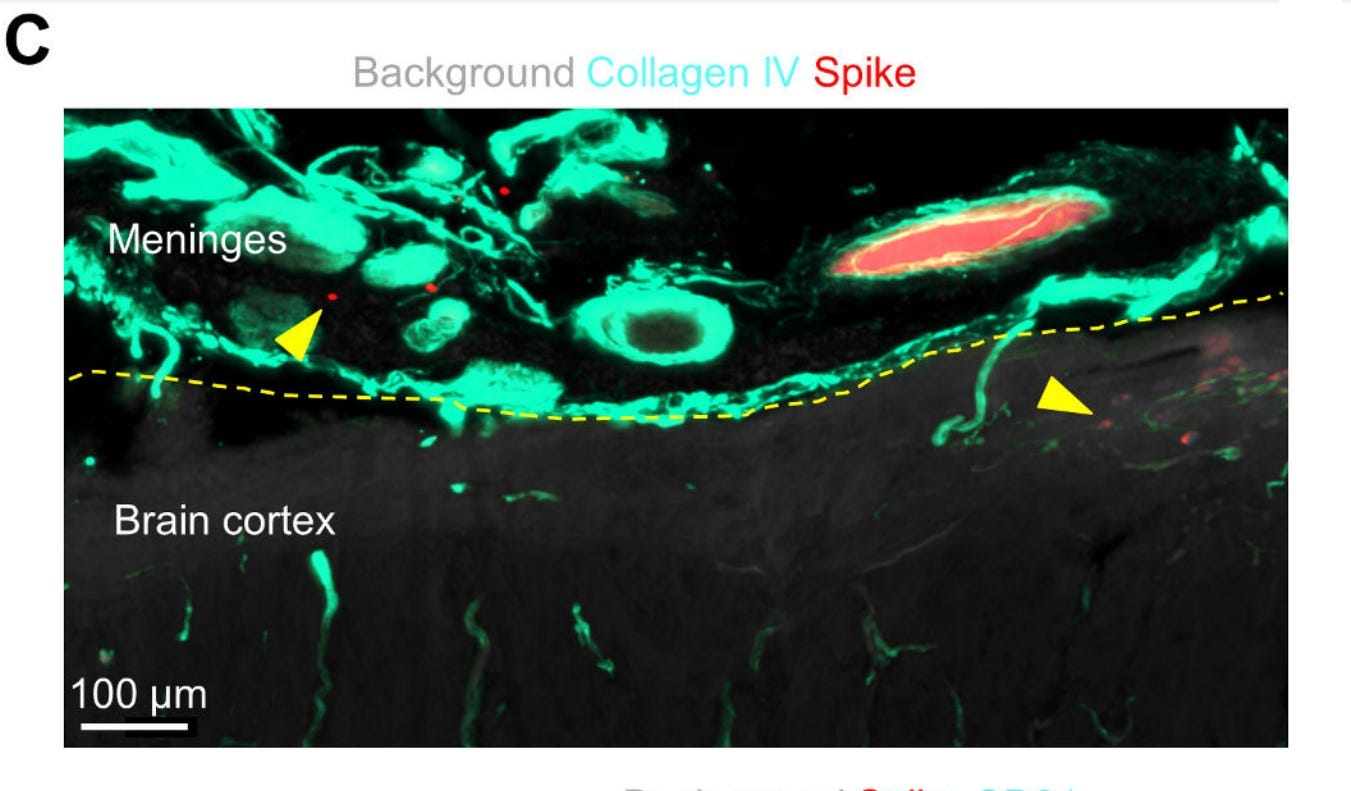Source:
https://makismd.substack.com/p/spike-protein-accumulates-in-the
Spike protein accumulates in the brain and causes infarcts, bleeds, inflammation - Pfizer & Moderna COVID-19 mRNA vaccines cause severe neurological injuries
A new paper from Germany posted on April 5, 2023 proves that the spike protein accumulates in the brain and causes death of brain cells (which would certainly explain a great deal of what we see around us). (click here)
Key findings:
“Our results revealed the accumulation of the spike protein in the skull marrow, brain meninges, and brain parenchyma.”
“The injection of the spike protein alone caused cell death in the brain, highlighting a direct effect on brain tissue.”
“we observed the presence of spike protein in the skull of deceased long after their COVID-19 infection, suggesting that the spike’s persistence may contribute to long-term neurological symptoms”
Spike protein damage:
Out of all COVID-19 viral proteins, only the spike protein was detected in brain parenchyma.
“suggesting that the spike protein could have a long lifetime in the body. This notion is supported by the observation that spike protein can be detected on patient immune cells more than a year after the infection - a recent preprint suggests spike protein’s persistence in plasma samples up to 12 months post-diagnosis”
“injection of spike protein induced a broad spectrum of proteome changes in the skull marrow, meninges, and brain, including proteins related to coronavirus disease, complement and coagulation cascades, neutrophil degranulation, NETs formation, and PI3K-AKT signaling pathway, demonstrating the immunogenicity of SARS-CoV-2 spike protein in the absence of other viral components.”
Brain inflammation
“Our molecular analysis suggests activation of immune response in the skull-meninges-brain axis, potentially via recruiting and increasing the activity of neutrophils similar to what has been reported in the respiratory tract”
“in the skull marrow…viral proteins act as an inflammatory stimulus that leads to the development of a significant immune response in the brain”
“In the meninges, a significant consequence of the inflammatory state is an upregulation of proteins involved in neutrophil degranulation”
“Proteins related to the neurodegeneration pathway and damage to the blood-brain barrier were the most prominent dysregulated molecules in the brain.”
“viral spike protein leads to the activation of RHOA, which triggers the disruption of blood–brain barrier”
Blood clots, mini-strokes, brain bleeds
“The dysregulation of the complement and coagulation pathways was detected in both the skull marrow and the brain. This might explain the observed propensity of COVID-19 patients to develop mini-infarcts in the brain parenchyma and our observation of an increased level of micro-bleedings in COVID-19 patients, potentially contributing to the observed brain damage in the COVID-19 patients in acute or chronic stages”
Spike protein and Neurological diseases
“We identified several candidate proteins with no previous association with COVID-19, especially those earlier associated with neurological diseases…notably, their role has been associated with disorders such as Parkinson’s disease, Alzheimer’s disease, and dementia”
“To further pinpoint the consequences of spike protein-specific effects in the brain tissue beyond the acute inflammatory response…We identified several dysregulated proteins associated with neurodegeneration”
“significantly impairs mitochondrial function…a source of oxidative stress reported in…long-term symptoms such as chronic fatigue”
How Spike protein gets into the brain
“Our data may also suggest a mechanism for the virus’s entry into the central nervous system. In both mouse and COVID-19 human tissues, we find spike protein in the SMCs (skull-meninges connection), which the virus or virus components could use to travel from the skull marrow to the meninges and the brain parenchyma”
“virus might take other routes to reach the brain in a not mutually exclusive way. For example, the virus could traverse the cerebrovasculature to reach the brain parenchyma or be carried there by immune cells (via neutrophils or phagocytic cells)”
“Brain invasion of virus-shed spike protein found in some COVID-19 cases has been linked to a compromised blood-brain barrier and trafficking along the olfactory nerve or vagus nerve. Here, we suggest an alternative scenario wherein SARS-CoV-2 spike protein reaches first the skull marrow and then the meninges before entering the brain.”
“Spike-induced alterations in the skull-meninges-brain axis present diagnostic and therapeutic opportunities as both skull and meninges are easier to access than brain parenchyma”
My substacks on psychosis post COVID-19 vaccination:
March 9, 2023 - Children who were injured by Pfizer or Moderna COVID-19 mRNA vaccines - Hallucinations, self-harm, suicide attempts, permanent disability (click here)
March 8, 2023 - COVID-19 vaccine induced psychosis - 13 cases of post vaccine psychosis, mania & suicide attempts that will shock you...(click here)
My Take…
This is an extremely important paper from Germany (we will never see this kind of research done in Canada).
This paper proves that the SARS-CoV2 and COVID-19 mRNA vaccine spike protein enter the skull marrow, meninges and the brain parenchyma.
The spike protein disrupts the blood brain barrier.
The spike protein alone causes cell death in the brain, it activates complement and coagulation pathways that lead to blood clots, mini infarcts and brain bleeds, it causes inflammation, and local changes associated with neurodegeneration (dementia, Alzheimer’s, Parkinson’s Diseases).
I believe that neurological injury is one of the biggest categories of COVID-19 mRNA vaccine injury. These injuries are extremely common, and we have only begun to see the long term effects of spike protein accumulation in the brain.
Beyond the strokes, aneurysms and brain bleeds, the vision and audiovestibular problems, all kinds of paralysis and movement disorders, I believe that among the COVID-19 mRNA vaccinated, we will see a huge spike in neurodegenerative disorders, mental health disorders and an overall increased risk of suicide.



No comments:
Post a Comment
Note: only a member of this blog may post a comment.